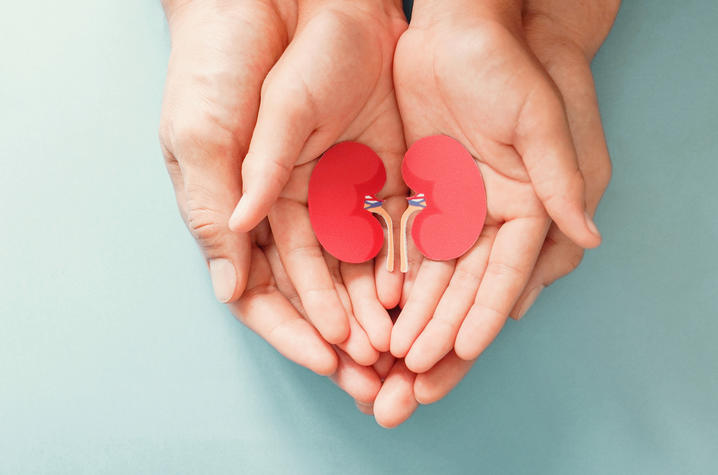Give the gift of life — What to know about donating a kidney

The University of Kentucky Public Relations and Strategic Communications Office provides a weekly health column available for use and reprint by news media. This week's column is by Todd Maynard and Rachael Benezet, living donor coordinators at UK HealthCare's Transplant Center.
LEXINGTON, Ky. (Apr. 3, 2023) — More than 800 Kentuckians are in need of a lifesaving kidney transplant. Living donation is an excellent alternative to donations from deceased donors. The wait time for a recipient can be a matter of weeks rather than years, and kidneys from living donors tend to work better and last longer than kidneys from deceased donors. If you’re interested in giving the gift of a second chance, here’s what you can expect.
It starts with a questionnaire. Candidates for living donation are asked for a complete medical history to determine whether they can safely donate. Those under the age of 45 with pre-existing health conditions such as hypertension and diabetes are disqualified from donating; however, those over 45 who take medication for their hypertension will be considered. A donation committee will review the history and if approved, the candidate will undergo a full medical exam involving blood work, urine testing, chest X-rays, and consultations with a nephrologist and social worker.
What to expect on the day of surgery. Once the candidate has passed the evaluation and completed testing, they will meet with a surgeon and transplant coordinator. Donors are educated on the procedure and are free at any point to change their minds — even if it’s 30 minutes before the surgery. There is no cost to the donor or the donor’s insurance for medical care.
Which kidney stays and which one goes? Usually the left kidney is donated, because it has longer blood vessels and gives the surgical team more to work with. Above all, the goal is to preserve kidney function in the donor, so if one kidney functions better than the other, the donor will keep the better one.
During and after surgery. The procedure, which takes about three hours, is done laparoscopically through a two-to-three-inch incision near the belly button. The donor is discharged after two days and are advised to avoid physical activity and exertion for about six weeks. After two weeks, the donor will follow up with your surgeon and return to the transplant center for lab work six, 12 and 24 months after the surgery.
Life with one kidney. Donors will experience a loss of kidney function, but the pre-operation evaluation determined they had enough function to spare. Donors should avoid NSAIDs (like ibuprofen), as those drugs can affect kidney function. There is an increased risk of complications during pregnancy after donation, so donors are advised to wait at least two years after their donation to get pregnant. The pregnancy will be considered high-risk and will require additional care.
Anyone over 18 years old who is in excellent overall health with above average kidney function and a willingness to help can be a living donor. A donor does not have to be a blood relative. A spouse, friend, coworker or anyone who is willing to help may be eligible to donate. If you’re interested in donating, contact the UK Transplant Center to begin the evaluation.
UK HealthCare is the hospitals and clinics of the University of Kentucky. But it is so much more. It is more than 10,000 dedicated health care professionals committed to providing advanced subspecialty care for the most critically injured and ill patients from the Commonwealth and beyond. It also is the home of the state’s only National Cancer Institute (NCI)-designated Comprehensive Cancer Center, a Level IV Neonatal Intensive Care Unit that cares for the tiniest and sickest newborns and the region’s only Level 1 trauma center.
As an academic research institution, we are continuously pursuing the next generation of cures, treatments, protocols and policies. Our discoveries have the potential to change what’s medically possible within our lifetimes. Our educators and thought leaders are transforming the health care landscape as our six health professions colleges teach the next generation of doctors, nurses, pharmacists and other health care professionals, spreading the highest standards of care. UK HealthCare is the power of advanced medicine committed to creating a healthier Kentucky, now and for generations to come.




